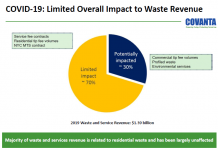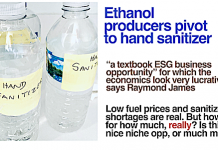by Debra Fiakas CFA
Last week the Chief Executive Officer of Green Plains Renewable Energy, Inc. (GPRE: Nasdaq), Todd Becker, revealed during conference calls following its quarter earnings report that the company has been in discussions to sell ethanol to industrial users in Mexico. It is news that could be music to shareholders ears. U.S. storage tanks are brim full of ethanol as producers like Green Plains stock pile inventories waiting for better selling prices. Green Plains has made claims to Mexico sales before, but has never revealed customer names or volumes. None were named this time.
Can Mexico rescue Green Plains from the ethanol doldrums?
Mexico reportedly bought 4% of U.S. ethanol exports in 2014. That is not an impressive all things considered. Canada and Brazil are more important and larger customers for the U.S. ethanol industry. In 2014, Canada bought over 1.2 billion liters of Yankee ethanol and Brazil placed orders for another 375 million liters. Even the United Arab Emirates is a more significant importer of U.S. ethanol, at least in terms of the rate of growth in purchases by that country.
However, the pace of purchases from our good friends down south could accelerate. At the beginning of 2015, Pemex, Mexico’s state-owned oil company, announced its intentions to begin selling gasoline mixed with ethanol as part of a plan to reduce emissions. However, Pemex let contracts to source ethanol from domestic producers not U.S. producers. Two of the initial contracts were cancelled due to ‘irregularities’, revealing the difficulty Mexico might be having in cultivating an effective domestic ethanol industry. Perhaps that will leave open a door for enterprising U.S. exporters.
Of course, ethanol is only one part of the picture. Ethanol production results in several by-products, including corn meal, corn oil and distillers gains among other agricultural products. Exports of ethanol production by-products continue to be robust and industry analysts are predicting strong long-term growth. Distillers grain (DDGs) exports by U.S. producers were $3.4 billion in 2014 , setting volume and value records. China is the largest importer of U.S. DDG production and Mexico comes in second place. The countries in the European Union favor U.S. corn gluten feed and Indonesia is the largest customer for corn gluten meal. About three-quarters of U.S. high-fructose corn syrup ends up in Mexico. The in the Middle East and Africa buy about two-thirds of U.S. corn oil production. Corn meal, feed and oil exports were valued at around $1.6 billion in 2014.
Besides the usual ethanol production by-products, Green Plains also earns fees for ethanol marketing, trading and logistics services provided to third-parties. Sales of by-products and services represent about 70% of Green Plains’ total sales.
Green Plains reported $3.2 billion in sales in the twelve months ending June 2015, providing net income of $88.3 million. Cash flows of $93.8 million for the twelve-month period are probably a better barometer for an ethanol producer. Free cash flow after capital expenditures was $33.5 million, enough to support a dividend near $12 million per year and meet debt payment obligations.
Despite the struggle that ethanol producers are facing at this point in the industry cycle, Green Plains appears to have the balance sheet to see it through to better times. At the end of June 2015, the company had $527.9 million in cash on the balance sheet. Total short- and long-term debt was $672.8 million.
Green Plains stock has been in a free fall for the past two months as investors anticipated the June quarter results. The company reported a profit in the quarter, but not enough to meet expectations for a far more robust performance. Perhaps management should spend more time simply producing sales and profits and less time pumping up investors for sales that have not been made yet.
Debra Fiakas is the Managing Director of Crystal Equity Research, an alternative research resource on small capitalization companies in selected industries.
Neither the author of the Small Cap Strategist web log, Crystal Equity Research nor its affiliates have a beneficial interest in the companies mentioned herein.








